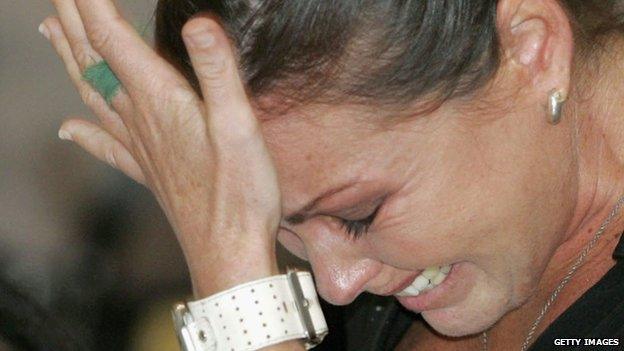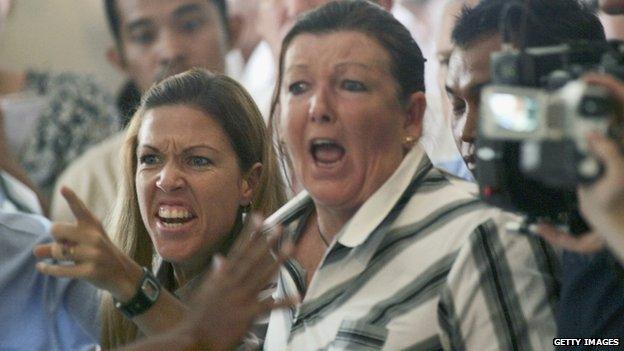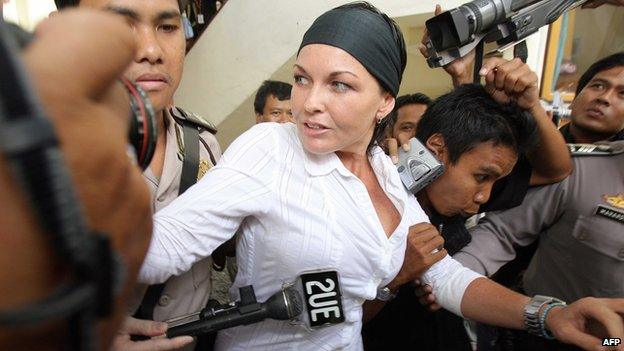Why Schapelle's story grips Australia
- Published

Australians watched live on television as Corby was jailed for 20 years
She is standing, shaking, dumfounded, looking around for a friendly face, angry and crying. Her white skin and western clothes — black top, light pink pants — contrast with the brown skin and uniforms of police and court officials.
As it dawns on her what's happened - guilty - she breaks down, her palms press hard up against her bowed forehead. Then, quaking, red-faced, palms out in Buddha fashion, she turns to her equally confused, soon-to-be apoplectic family: "Mum, it's OK."
But it isn't. And it won't be for a long time.
This is how, almost nine years ago, millions of Australians witnessed live on TV Schapelle Corby make the descent from one-time Gold Coast beauty student to convicted drug smuggler, sentenced to 20 years in an Indonesian jail for importing 4.1kg of marijuana in a boogie board bag.
Those few minutes, her confusion giving away to terror, are burnt into the nation's memory.
Ever since, Corby, now 36, has lived out her term in Bali's Kerobokan prison in quasi-public - her blue eyes and arched eyebrows often staring out from behind bars or her body squeezed between prison officials on the way to court.
Protesting her innocence and claiming the drugs were planted, Corby has gone from arrest (in Oct 2004), trial (Jan 2005), conviction (May 2005), appeal (2006), appeal rejected (March 2008), a presidential clemency requested (April 2010), clemency granted (May 2012), application for parole (Oct 2013) and now parole signed and delivered.
With time in jail offset with remissions for good behaviour, she will have served more than nine years and be free to return to Australia after serving out her parole at her sister Mercedes's house in the backstreets of Kuta, Bali's party district. She is not expected to be free to leave the country until 2017.
Lurid headlines
The exhaustive legal process, at times a burr in the side of Australian-Indonesian relations, has at times seemed more like the macguffin to the real plot: the raw, sensational and hotly-contested journey of an Aussie surfie chick trying to survive in a crowded Asian prison.
This has played out in supermarket magazines (in a series of content deals with the Corby family), books (including her own), tabloid TV shows and tele-movies, the latest of which is due to air across Australia on Monday night.

Corby's family have continued to make headlines as she has served her jail term
In the court of public opinion, Schapelle, as she is simply known, has been at various times seen as an innocent duped and then trapped in an uncaring, harsh country or a willing drug mule of her late father, Mick Corby, who, according to journalist and author Eamonn Duff, was part of a marijuana smuggling syndicate.
Corby senior, who died in 2008, denied any knowledge of the drugs found on his daughter.
Asked if she's guilty or not, Duff, whose book, Sins of the Father, informs the new tele-movie, replies: "absolutely guilty". But he has sympathy for her "years lost". "It's a massive chunk of your life," he says.
Not since Lindy Chamberlain, jailed and eventually acquitted of killing her own daughter, Azaria, in 1980, has there been a more divisive female Australian inmate nor such a feast of lurid headlines, allegations and political pressure points. Much of it has been pure tabloid.
There has been Schapelle's prison baby (untrue), her fight against depression, possible suicide attempts, doubts about her sanity, a song to bring her home - to the tune of John Lennon's Happy Xmas (War is Over) - petitions to do the same, and, in one of the most bizarre episodes, a push by her mother, the feisty fish and chip operator Rosleigh Rose, to swap herself for her daughter in prison.
"My daughter is innocent, I'm an innocent person too, so why shouldn't I be able to take her place for a crime she never committed?" she told Woman's Day magazine in September 2009.
But there has been a deeper, more serious side. Successive Australian prime ministers have been pressured to intervene and the former premier of Queensland, Anna Bligh, offered to bring her home. More recently, the recent revelations that Australia spied on Indonesian President Susilo Bambang Yudhoyono in 2009 have reportedly set back Corby's release.
But Ross Taylor, the chairman of Perth-based Indonesia Institute, a think-tank that aims to foster relations between the two countries, argues that politics has played little role in the travails of Corby, especially not now with the Indonesian election season fast approaching.
"The starship Indonesia is at best on auto pilot because the crew is out the back working out who is going to fly the plane and where it's going to land," he says.
'Enormous interest'
Where consensus can perhaps be found is on the length of her sentence: many Australians believe it was too long. A poll in May 2012, in Fairfax Media, found 43% in favour of her gaining clemency, even though 60% of those surveyed agreed she was guilty as charged.

The huge media interest in Corby is not expected to diminish after her release on parole
There is a sense in Australia that Corby, irrespective of her guilt, has been treated harshly - or could have been treated with more leniency - because she is an Australian.
Around the time of her conviction her sentence was compared with the 2.5 years given by Indonesian courts to Abu Bakar Bashir, the radical Islamic cleric found guilty of conspiracy in relation to the 2002 Bali bombing that killed 200 people, including 88 Australians.
This argument ignores the fact that three of the actual bombers were killed by firing squad, albeit in 2008, three years after Corby was sent down.
It also sidesteps the well-known fact that Indonesian authorities, from the president down, employ a zero tolerance approach to drug importers. When Corby was first arrested it was reported she could receive a death sentence.
With Corby free, the burning question is will she sell her story? How much will it cost? And will she tell the truth, the whole truth?
Speculation, informed by past celebrity deals, is that she'll be worth A$3m ($2.7m, £1.6m) to a commercial TV channel with magazine and book add-ons.
Though unable to nominate a sum, the network news director of Channel 7, Rob Raschke, says: "I think it is very hard to overstate her currency as a story. Enormous interest."
Celebrity agent Max Markson, who is not representing Corby, argues Schapelle's story will keep giving. "She's so controversial: half the public think she's guilty, half the public think she's innocent. There will be stories galore coming out."
Indeed. But, as Duff suggests, Corby's answers may not satisfy the public. "People want some serious questions answered after all this time," he says. "They want some proper questions answered."
And what if the stories of her depression and questions about her sanity are in fact true, even though she's reportedly looking forward to some unsurprising and pretty sane comforts: clean sheets, a swim and a beer with mates.
Hounded by sections of the media and holed up in her sister's compound, is Schapelle Corby about to swap one prison in Bali for another?
Peter Fray is the editor-in-chief and founder of the political fact-checking site, PolitiFact Australia, an adjunct professor at Sydney University and the former editor-in-chief of the Sydney Morning Herald.
- Published23 May 2012